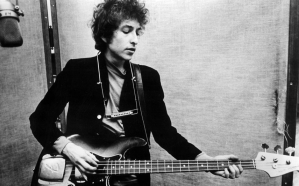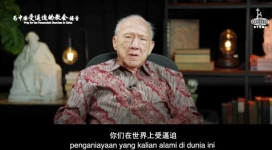
Despite the fact he was born and raised Jewish, Robert Allen Zimmerman, widely known as legendary American singer Bob Dylan, had some surprising remarks about Rev. Billy Graham, comparing him to a bona fide "rock 'n' roll" star. He also talks about folk music and the notion of romantic love.
In an interview conducted by Robert Love in the latest edition of AARP Magazine, Dylan talked about the influence the iconic American preacher had in U.S. culture back in the 1950s and 1960s. He focused on the popularity that Graham enjoyed.
"He was the greatest preacher and evangelist of my time - that guy could save souls and did," Dylan said. "I went to two or three of his rallies in the '50s or '60s."
Dylan contended that Graham shared attributes with "rock 'n' roll" stars, noting that the minister was "volatile, explosive."
"He had the hair, the tone, [and] the elocution - when he spoke, he brought the storm down," Dylan said. "Clouds parted. Souls got saved, sometimes 30- or 40,000 of them."
The singer, who became a born-again Christian in the 1970s, observed that people changed after they headed to a rally conducted by Graham.
"If you ever went to a Billy Graham rally back then, you were changed forever," Dylan said. "There's never been a preacher like him."
According to Dylan, the American preacher had no problem attracting crowds to listen to his sermons.
"He could fill football stadiums before anybody," Dylan said. "He could fill Giants Stadium more than even the Giants football team. Seems like a long time ago."
Dylan contended that Graham had influence "long before Mick Jagger sang his first note or Bruce [Springsteen] strapped on his first guitar."
"That's some of the part of rock 'n' roll that I retained," Dylan said. "I had to. I saw Billy Graham in the flesh and heard him loud and clear."
Dylan made those comments about Graham in response to a question posed by Love about the viability of folk music. He told Love that "folk music came at exactly the right time in my life."
"It wouldn't have happened 10 years later, and 10 years earlier I wouldn't have known what kind of songs those were," Dylan said. "They were just so different than popular music. But it came at the right time, so I went that way."
The music star argued that folk music was still "a vibrant form of music," even though the genre isn't exactly part of the "pop realm."
"I had gotten in there at a time when nobody else was there or knew it even existed, so I had the whole landscape to myself. I went into songwriting," Dylan said. "I figured I had to - I couldn't be that hellfire rock 'n' roller. But I could write hellfire lyrics."
Dylan talked to Love about his new album, "Shadows in the Night." Love asked him on whether or not young people will see his music as "corny," given that the notion of "romantic love" in modern U.S. culture has given way to casual dating and sex encounters as opposed to the "painful pining of the '40s and '50s."
"These songs, take 'em or leave 'em, if nothing else, are songs of great virtue," Dylan said. "That's what they are. If they sound trite and corny to somebody, well so much for that. But people's lives today are filled on so many levels with vice and the trappings of it."
Dylan contended that vices such as ambition, greed and selfishness destroy people. He noted that the glamour of vice is emphasized more than its damaging nature, which can lead to "the destruction of human life and the mockery of it."
"Sooner or later, you have to see through it or you don't survive," Dylan said. "We don't see the people that vice destroys. We just see the glamour of it on a daily basis everywhere we look."
The iconic singer defended the songs' notion of romantic love.
"Romance never does go out of fashion. It's radical," Dylan said. "Maybe it's out of step with the current media culture. If it is, it is."
Dylan also shared some sobering advice aimed at everyone, especially young people.
"You just have to keep going to find that thing that lets you in the door, if you actually want to get in the door," Dylan said. "Sometimes in life when that day comes and you're given the key, you throw it away. You find that whatever you were looking for your entire life isn't where you thought it was."







